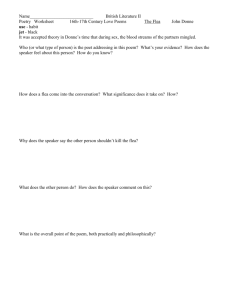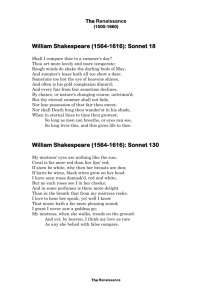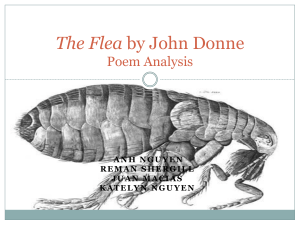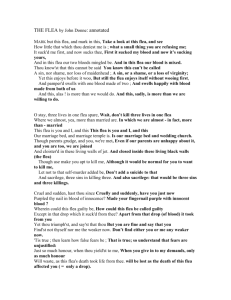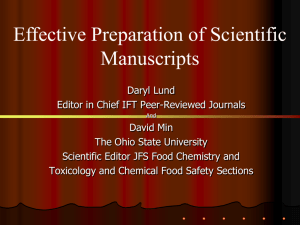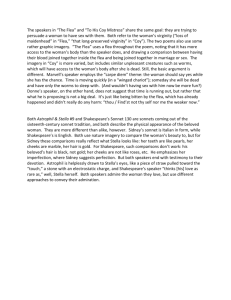Slide 1 - Cloudfront.net
advertisement
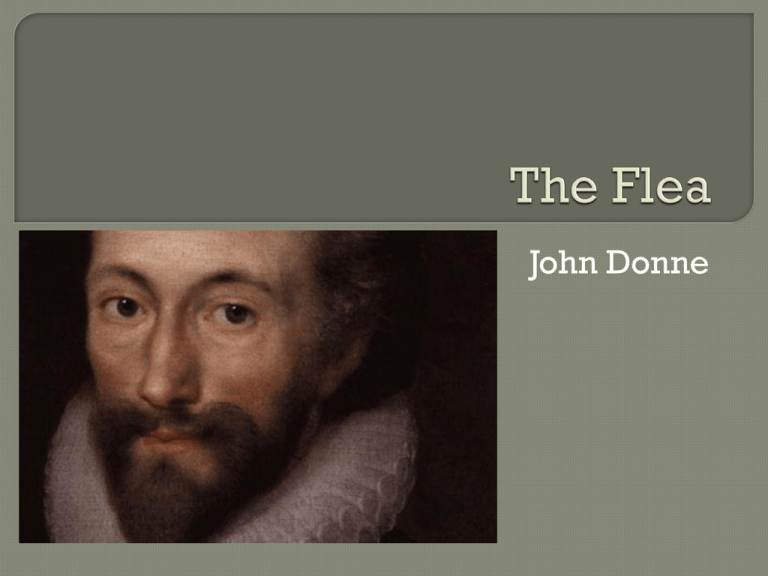
John Donne The author of "The Flea" is John Donne, a English and metaphysical poet. He was born into a catholic family on January 22 , 1572 in London, United Kingdom. Donne's father died in 1576 and his mother later married a wealthy widower and she sadly died on March 31, 1631. At the age 11 John Donne entered Oxford University. After he attended the University Cambridge John Donne began studying law at Lincoln Inn at the age 20. Donne wrote most of his love and erotic poems during the 1590s. After Donne's brother Henry died in prison, John started questioning his religion. Around 1600 fleas were seen as just natural parts of a bedroom scene. Donne referred to the flea as a creature that sucked both their bloods. Unlike other poets, he didn’t describe various body parts that the flea visited. Donne was a young man and was described as a man who got a lot of attention from woman. He might have been used to a quick response from a woman, but didn't get his way so easily with the woman in this poem. In 1601 Donne secretly married Anne More, Sir Thomas Egerton's 16 year-old niece. This was a reckless romance that sent him to jail and then poverty. It is possible that this poem refers to a love scene before they ran away and got married. In 1610, John Donne published " Pseudo Matyr" a anti-Catholic polemic where he renounced his faith. In 1615, Donne converted to Anglicanism and became royal chaplain. John Donne's wife died shortly after giving birth to their twelfth child. He no longer wrote love poems after her death and focused on religious subjects. He became dean of St. Paul's Cathedral and severally ill. While he was ill he published "Devotions upon Emergent Occasions" in 1624. John Donne's death continued to fail him and he became obsessed with death. He knew he was going to die soon and delivered a pre-funeral sermon "Death Duel." Sadly, John Donne died on March 31, 1631 in London, England. This poem alternates metrically between lines in iambic tetrameter and lines in iambic pentameter. This poem has a 4-5 stress pattern ending with two pentameter lines at the end of each stanza. The stress pattern in each of the nine line stanzas is 454545455, the rhyme scheme of this poem is: aabbccddd. The rhyme scheme in each stanza is similarly regular couplets, with the last line rhyming with the final couplet. The first and last line of each stanza has eight syllables. Poetic device used: conceit (extended metaphor) including in lines 1,5,12,19, and 23. The tone at first seems conversational discussing, an innocent flea who has sucked two lovers blood, however as the poem continues the tone becomes more rhetoric and persuasive. This poem again exhibits Donne's metaphysical love, his aptitude of turning the least likely images into elaborate symbols of love. Mark but this flea, and mark in this, How little that which thou deny’st me is; It sucked me first, and now sucks thee, And in this flea our two bloods mingled be. Thou know'st that this cannot be said A sin, nor shame, nor loss of maidenhead; Yet this enjoys before it woo, And pampered swells with one blood made of two; And this, alas, is more than we would do. Oh stay, three lives in one flea spare, Where we almost, yea more than married are. This flea is you and I, and this Our marriage bed, and marriage temple is. Though parents grudge, and you, we are met And cloistered in these living walls of jet. Though use make you apt to kill me, Let not to that self-murder added be, And sacrilege, three sins in killing three. Cruel and sudden, hast thou since Purpled thy nail in blood of innocence? Wherein could this flea guilty be, Except in that drop which it sucked from thee? Yet thou triumph'st, and say'st that thou Find'st not thyself nor me the weaker now. 'Tis true ; then learn how false fears be; Just so much honor, when thou yield‘st to me, Will waste, as this flea's death took life from thee. Mark but this flea, and mark in this, How little that which thou deniest me is; It sucked me first, and now sucks thee, And in this flea our two bloods mingled be; Thou know’st that this cannot be said A sin, nor shame, nor loss of maidenhead, Yet this enjoys before it woo, And pampered swells with one blood made of two, And this, alas, is more than we would do. “The Flea” is a poem about a man who wants to have sex with a woman who denies his offer. In each stanza, you will see that he tries a different approach. In the first stanza, Donne attempts to convince the women by making a comparison between them and the flea. The speaker tells the woman that even though they haven’t had sex that in a way, they have been united. He shows her this by saying that the flea sucked some of his blood and then sucked some from her. Like this they had not committed a sin, shame or she has lost her virginity. The flea makes this unity even before he gained her love; the flea is spoiled with both of their bloods that have been mixed into one. This expression of unity inside the flea goes beyond what they would do. Oh stay, three lives in one flea spare, Where we almost, nay more than married are. This flea is you and I, and this Our marriage bed, and marriage temple is; Though parents grudge, and you, w'are met, And cloistered in these living walls of jet. Though use make you apt to kill me, Let not to that, self-murder added be, And sacrilege, three sins in killing three. In the second stanza Donne wants to save the flea because inside this flea is their relationship that is bigger than marriage. The speaker tells her that now the flea is not only a flea but now it is her and he. He uses persuasive language to woo his lover “this flea is you and I.” He says that the flea now has become their marriage bed and temple. Even with her parent’s strong will and hers they cannot undo the unity inside the flea’s body. In line fifteen he personifies “living walls” and uses them as a reference to the flea. Then the man tells the woman not to kill the flea because not only would she murder the life of a flea but the three of them which would be a sin. He shows her negative attitude towards his lover because he is trying to make her feel as if she was the one doing something bad. Cruel and sudden, hast thou since Purpled thy nail, in blood of innocence? Wherein could this flea guilty be, Except in that drop which it sucked from thee? Yet thou triumph’st, and say'st that thou Find’st not thy self, nor me the weaker now; ’Tis true; then learn how false, fears be: Just so much honor, when thou yield’st to me, Will waste, as this flea’s death took life from thee. In the third stanza the woman carelessly kills the flea making her finger filthy innocent blood. This is a significant allusion to the bible related to the birth of Jesus Christ. At the time when Jesus was born, the king Erode had all children within the age of one and two killed. He tells her that the flea was innocent, the only thing that the flea had done was sucking out a drop of blood from her. She finds herself victories and feels that neither of them is weaker now. He shows her that the flea only took little blood from her. He feels that she lost as much honor in losing her virginity to him as the small amount of blood the flea took. Mingled: to mix or combine Cloistered: to close or be shut Sacrilege: the violation or profanation of anything sacred or held sacred. Triumph’st: the act, fact, or condition of being victorious 1. What type of poet is the author? 2. When was John Donne born? 3. Which line uses personification? 4. What does the speaker’s lover do to the flea? 5. Which lines used enjambment? 6. What is the rhyme scheme of the poem? 7. What type of language did the speaker used to woo his lover? 8. How many lives did the speaker’s lover killed when she killed the flea? 9. What’s the definition of mingled? 10. True/ False John Donne tries to save the flea because inside this flea is their relationship that is bigger than marriage.
